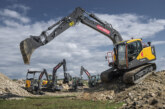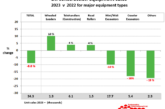The construction hire industry in Scotland has a hire revenue turnover of £1bn and our membership represents 97% of the construction equipment hire companies in Scotland.
Our members are fully behind the policy aims of this subsidy removal to create lower carbon emissions, however a clearly thought out timeline of 7 years is required to allow the life cycle of our member machinery to end and our Equipment Manufacturers (OEMs) to have the necessary green products in place.
The hire industry by its very nature is part of the circular economy whereby we allow lots of people to use our machines thus stopping the necessity for everyone to own one resulting in the hire industry having a positive impact on the environment. At the end of machine life we then sell to other countries and the process starts again. This simple fact should result in the hire industry being an exempt industry and allowed to continue with the red diesel subsidy with a 7 year timeline before the subsidy is removed.
As they were the questions relevant to our members, we have only replied to the consultation questions 5, 6, 7, 8, 9, 17 and 23.
Mark Anderson
President of the Scottish Plant Owners Association
Will removing the entitlement to use red diesel in your sector create perverse environmental outcomes? If so, please explain how, providing relevant evidence.
Our members invest heavily in equipment and Tier 5 engines are already dramatically more efficient than those used in the car industry. A perverse environmental outcome is that our members are likely to continue to use older, more inefficient machinery for longer than otherwise expected (1) to mitigate the costs of the removal of the rebate and (2) because new investment for a shorter life cycle than 7 years (assuming green alternatives become available) is not viable.
In the short term the removal of red diesel subsidy will neither create nor reduce the environmental impact in our industry. Typically hire companies run their equipment for between 5 and 7 years, the very nature of our industry is we hire out used equipment, thus a 2 year period before the subsidy removal will not allow sufficient time to bring in alternative fuel machines. Furthermore OEM’s will not be in a place to offer a wide enough range of machinery within this time period.
Will removing the entitlement to use red diesel in your sector have an impact on the price of goods and services households and/or voluntary organisations use or pay for over the long-term? If so, please provide relevant evidence.
Households and/or voluntary organisations are frequently customers of our members. Not all construction projects are on a commercial scale.
The removal of the red diesel subsidy will mean an increase in three ways:
- Where machinery is hired with an operator the hourly rate will increase by the same amount the red diesel subsidy represented
- Where machinery is hired without an operator the fuel top up charge at the end of the hire will be charged at the rate plus overheads of white diesel
- Where machinery is used in quarrying the cost per tonne of materials will increase by the same amount the red diesel subsidy represent
Thus in all examples our industries customers both private and Government funded will pay more to complete projects.
How will removing the entitlement to use red diesel in your sector impact your organisation? Please provide details on:
Your organisation/sector’s current red diesel consumption and costs, including as a proportion of total costs, and broken down by different uses (i.e. what types of vehicles and machinery)
Our records also indicate that the plant hire industry in Scotland’s red diesel consumption is £95m per annum and this figure is 100% attributable to hired out machinery.
The hire revenue turnover of the Scottish hire industry is circa £1bn per annum, and, from our records, currently 99.7% of this revenue is from machines which operate on red diesel. The total Gross Book Value (GBV) of equipment the SPOA members own is £2.5bn or circa 100,000 individual items of plant.
The operational and financial capacity of your organisation/sector to shift to alternatives to red diesel (specifying what these alternatives are)
Operational Capacity
Currently OEM’s have introduced alternative powered machines (Battery and Hydrogen) up to 3T machines this represents only 7% of the machinery hired out in the Scottish plant hire industry (£70m) if we got 100% compliance.
Typically hire companies run their equipment for between 5 and 7 years, the very nature of our industry is we hire out used equipment, thus a 2 year period before the subsidy removal
will not allow sufficient time to bring in alternative fuel machines. Furthermore OEM’s will not be in a place to offer a wide enough range of machinery within this time period.
There should be at least a 7 year time line put in place before removal of the subsidy – consideration should be made by the Government to have the hire industry as one of the exempt industries like agriculture.
Financial Capacity
Alternative powered machines are typically three times as expensive as the diesel engine equivalents.
We do not yet know the residual value of generation one alternative powered machines, typically the first generation of any product is lower than expected.
Furthermore (1) the utilisation of alternative powered machines is and will not be as high as diesel machines due to the limitation of the technology and (2) if the rest of the world is still using diesel machines the residual value of alternative powered machines will reduce due to the limited market for re-sale.
And, we do know that the introduction of alternative powered machines and the removal of the red diesel subsidy will reduce the residual value of diesel machines
Thus, due to all the above points our hire rates for alternative powered machines will be over three times the current diesel rate. This will make the cost of jobs more than the diesel equivalent without even considering the removal of the subsidy.
As the introduction of alternative powered machines and the removal of the red diesel subsidy will reduce the residual value of diesel machines, the Government should consider a scrappage scheme for our industry to encourage the move to alternative powered machines.
The capacity of your organisation/sector to pass through costs down the supply chain
Both our hire rates and fuel costs will increase. We will pass the increased cost directly onto our end customer whether private or Government. They will notice the increased cost.
The capacity of your organisation/sector to absorb extra costs
The SPOA members like most companies involved in the construction sector make very slim margins – we would foresee 100% of the subsidy removal being passed on. In addition our hire rates would also increase as outlined in point b above.
What impact do you expect the removal of red diesel entitlements from most sectors will have on the environment and on air quality? Please provide any evidence you deem relevant.
Unfortunately in the next 7 years very little difference.
Our members are fully behind the aims of this subsidy removal to create lower carbon emissions however a clearly thought out timeline of 7 years is required to allow the life cycle of our member machinery to end and our OEM’s to have the necessary product in place.
Do you have any comments on the government’s intention to maintain the entitlement to use red diesel for agriculture (as well as forestry, horticulture and pisciculture), rail and for non-commercial heating (including domestic heating) from April 2022?
62 of the 260 SPOA members are involved in agriculture and machinery hire they will gain an unfair competitive advantage when tendering for work as their overheads will be lower.
There should be at least a 7 year time line put in place before removal of the subsidy from the hire industry – consideration should be made by the Government to have the hire industry as one of the exempt industries like agriculture.
Is the government’s suggested approach to compliance proportionate and appropriate? If not, please explain why and outline any scenarios that you anticipate may require bespoke compliance powers or penalties.
The government’s suggested approach to compliance is only theoretically proportionate and appropriate. It assumes the issue is about purchase of red diesel after April 2022 but ignores what happens to red diesel that is already in the tank on that date. Our members won’t drain the tank, lines or injectors but will just continually top up with white diesel so there could be residue in the machine for up to 12 months. Seizure of machines albeit with the right to then satisfy compliance officers is an excessive remedy in that first 12 months period.
Is there anything you have not already included in your response that you would like us to note about the impact of the changes to the tax treatment of red diesel, especially any potentially adverse impacts on groups with protected characteristics?
White diesel is more attractive to steal than red diesel because the market is every user of diesel.
To date, theft of red diesel has been more in the nature of pilfering. Theft of white diesel will be scaled up organised crime.
There will need to be added security on construction sites to stop fuel theft if white diesel, without dye, is now the main fuel. This will be an added cost for the Contractor who controls the site.
The increased attraction of fuel theft also puts at risk the security of the equipment stored on the site. Our members can anticipate their insurance costs increasing.
The increase in theft will also present a risk to human life as not all people stealing fuel will do this safely and the removal and transportation could lead to unintended consequences including environment spills and potential loss of life if removed or transported incorrectly.









